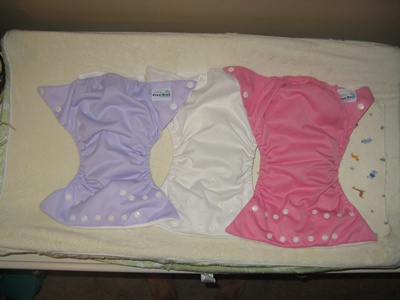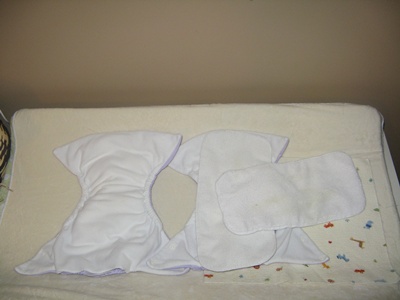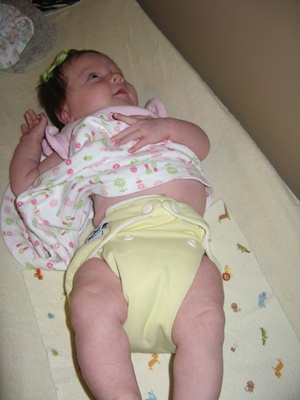Not Your Daddy’s Diapers
Seriously? Your doing what?
That is the typical response Beth and I get when we inform people we are using cloth diapers. There are varying levels of shock. Some people think we are absolutely crazy, others are cool with it until we tell them we are not using “a service” but washing them ourselves. Most people can appreciate the idea but insist it is not worth the effort. At least half try to wager with us that we will stop using them within a month or so. Very few are excited about it and open to cloth diapers as a mainstream option.
To the doubters, I must insist: you simply do not understand.
These are not the cloth diapers my generation was raised on (my parents started me on cloth, but abandoned early on). Many people blindly assume that using cloth diapers involves rubber bloomers and safety pins. While you can still do it like that, things have come a long way. Beth and I use a brand called Fuzzi Bunz that are of a style known as pockets. Basically they look like regular diapers. They have a water proof shell, a fleece liner and a place where you can insert micro-terry pads. Fuzzi Bunz use snaps and adjust to wide range of sizes (other pocket styles use velcro). Putting the diapers on and taking them off is as easy as disposable.
What about cleaning them?
That is where admitedly it gets a bit more difficult than disposable. You don’t just throw them away [TANGENT: this is actually the primary reason we went with cloth diapers, we could not stand the thought of throwing away 8-12 diapers a day for the next 2 years]. We do it this way: Right after changing Mikayla, we take the daiper to the backroom, rinse the poo off in the toilet and then throw the diaper into a plastic 5 gallon bucket with lid and sprinkle a little baking soda every now and again. At most it takes an additional minute to do this step. When we are on the road, we carry a water proof bag with us and just rinse the diapers when we get home. When we running low (we have 27 diapers now) we take the whole bag to the washing machine, dump it out, run it through a rinse cycle with cold water, and then wash Hot/cold with Purex Free and Clear. We then pop the inserts in the dryer and let the shells air dry. After they are dry it takes about 15 minutes to stuff the diapers (which I usualy do while watching TV). We do about 2 loads a week.
Total additional time commitment: (1 minute extra changing time x 10 / day) + [(10 minutes to wash / dry + 15 minutes to stuff) x 2 / week) = 2 hours / week.
2 hours may seem like a lot, but when you think you spend 2-3 minutes per diaper change anyway, you are already looking at 2.5-3 hours/week on diapers, and if feedings take 20 minutes x 8 times per day you are looking at 18 hours/week with that. Lets face it, babies take time, and the 2 hours you spend on clothe diapers are not productive minutes you are wasting, but idle minutes. Compare that to the teenage years where every soccer game requires a two hour commitment of prime evening time!
What about cost?
Cloth diapers can be expensive. Fuzzi Bunz are around $18 apiece. BUT… we buy our diapers from a diaper exchange site called Daiper Swappers. (Be careful… these “mommies” are intense – it takes about a week’s learning curve to understand the forum.) and get them for between $5-10. Yes they are used, but they still have plenty of life left in them. To get us started it took about a $220 investment. However, when you consider we will be able to sell those back and purchase the next size, we will be able to recoup most of our money. If you shop around and are patient you can get good deals and then actualy sell them back for a profit. That is what our friend Michelle does. So when you consider it, we will basically get our diapers for free. Compare that to my sister in law who spends $100/month on diapers for her two boys. Even if you buy new, you are saving money. [NOTE: Fuzzi Bunz come in multiple sizes as well as an adjustable model that allows you to stay in one size for the whole time your baby is in diapers. According to their website, most babies only use two sizes: S and M. There are 4+ size options on each diaper and Mikayla is still on the smallest setting]
I am not saying cloth diapers are for everyone, but after doing our research and going through the process for 2 months, we are totally satisfied. With Beth breastfeeding and us using cloth diapers, our monthly costs for Mikayla are close to zero. To end, here are some pointers we have learned so far to:
- Get a dry pail for home use. We picked up a 5 gallon bucket and lid for less than 5 dollars at Lowes.
- Have at least two wet bags for traveling (3-4 would be better).
- Since we bought used, our micro terry inserts have a variety of thicknesses. We put the thicker ones in the colored diapers and the thinner ones in the white diapers. That way it is easy to tell which have great absorbency when using them overnight, or for a long car ride. [Update: We ended buying more “doubler” inserts — basically thin inserts that can be added when you need extra absorbency — and making all of our diaper thicker”]
- Take the time to understand the various styles. Fuzzi Bunz are not the only type, but after comparing different brands, it was obvious this was the right match for us. (others are cheaper, but require more work; others use velcro which is easier to use, but can wear out faster).
- Be prepared to change diapers a bit more frequently because there are no chemicals to instantly dry the liquid.
- While you could make it with 10-12 diapers, it is well worth the extra money to get 20-30. Not only do you only have to do wash every 3 days or so, but it saves water because you can do larger loads.
- We still use disposables on occasion. We have been using them at night simply because we were given so many at showers. It is also nice to have them when traveling, but using a wet bag is not difficult or messy at all.
- We haven’t had to do this yet, but the word on the street is that you can get rid of pesky stains by letting the diapers sit out in the sun.
- Finally, don’t knock ’em until you have tried ’em.


